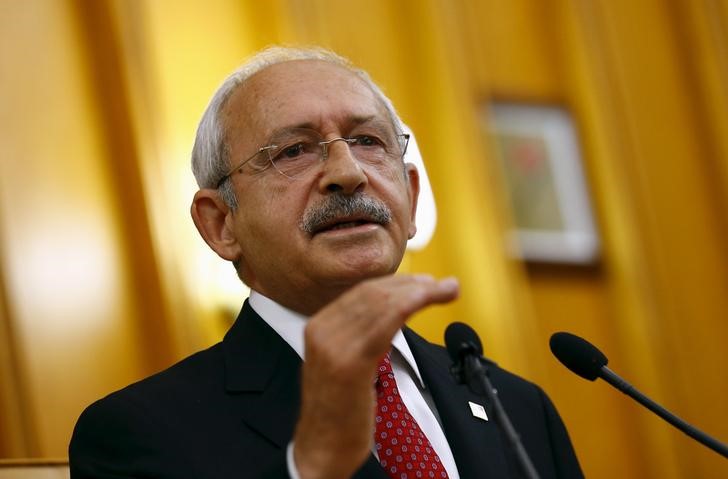By Gulsen Solaker and Ercan Gurses
ANKARA (Reuters) - Turkey faces a snap election this autumn after talks on forming a coalition government broke down on Thursday, increasing uncertainty in the NATO member state as it battles Islamic State insurgents on its borders and Kurdish militants at home.
Prime Minister Ahmet Davutoglu said a fresh election now appeared to be the only option after last-ditch negotiations between his Islamist-rooted AK Party and the main opposition CHP yielded no deal. He urged parliament to call for a new vote and said he would prefer it was held as soon as possible.
"An understanding has emerged that there are no grounds right now to form a government partnership," Davutoglu told a news conference after meeting CHP leader Kemal Kilicdaroglu.
"It seems that ... the duty of appealing to the national will again once all channels are exhausted, to ensure the permanent stability of our country, has increased greatly as a possibility. Actually it has become the only possibility."
The news sent Turkish assets tumbling. The lira currency
"From a sentiment standpoint, Turkey needs a snap election right now like it needs a hole in the head," said Nicholas Spiro, managing director of Spiro Sovereign Strategy in London.
The political uncertainty coincides with almost unprecedented threats to Turkey's national security.
The European Union candidate nation has been on a heightened state of alert since launching a "synchronised war on terror" last month, including air strikes against Islamic State fighters in Syria and Kurdistan Workers Party (PKK) militants in northern Iraq. It has also rounded up hundreds of suspected militants.
The AKP could now try to strike a coalition agreement with the nationalist opposition MHP. But a senior ruling party official said the chances of such a deal were "very slim" and that a snap election in November was a high probability.
The AKP failed to win a parliamentary majority in an election on June 7, leaving it unable to govern alone for the first time since it came to power in 2002.
Davutoglu has until Aug. 23 to find a junior coalition partner or President Tayyip Erdogan, who founded the AKP, could call a snap election. The prime minister urged parliament not to leave the decision to Erdogan, suggesting he wants an agreement on a temporary government before that deadline.
The MHP has said it does not favour a coalition with the ruling party, but has hinted it could support a short-lived minority AKP government as long as it leads to a quick election.
In a statement suggesting talks would not be easy, the MHP said late on Thursday that its conditions - including ending a peace process with Kurdish militants and limiting Erdogan's influence on the government - had not changed.
BLAME GAME
Erdogan has made clear he favours a single-party government and has made no secret of his ambition to change the constitution and create an executive presidency, virtually impossible without a strong AKP majority.
Davutoglu said, however, the perception that Erdogan had been against a coalition deal was "completely false". Major areas of policy disagreement had emerged during the negotiations with the CHP, he said, with education and foreign policy among the most contentious issues.
The AKP had also backed the idea of a "reform-oriented" short-term government to take the country to an early election, while the CHP had been pushing for a long-term coalition agreement, Davutoglu said.
Kilicdaroglu said there was never a real coalition proposal from the AKP and that it had only wanted either a short-term deal or support for a minority government. Turkey had missed a "historic opportunity", he said, adding that it was "not moral" for Davutoglu to now retain the mandate to form a government.
A grand coalition between AKP and CHP would have meant bridging a gaping ideological divide.

The socially conservative AKP has its roots in Islamist politics, while the staunchly secular CHP is the party of modern Turkey's founder, Mustafa Kemal Ataturk.
